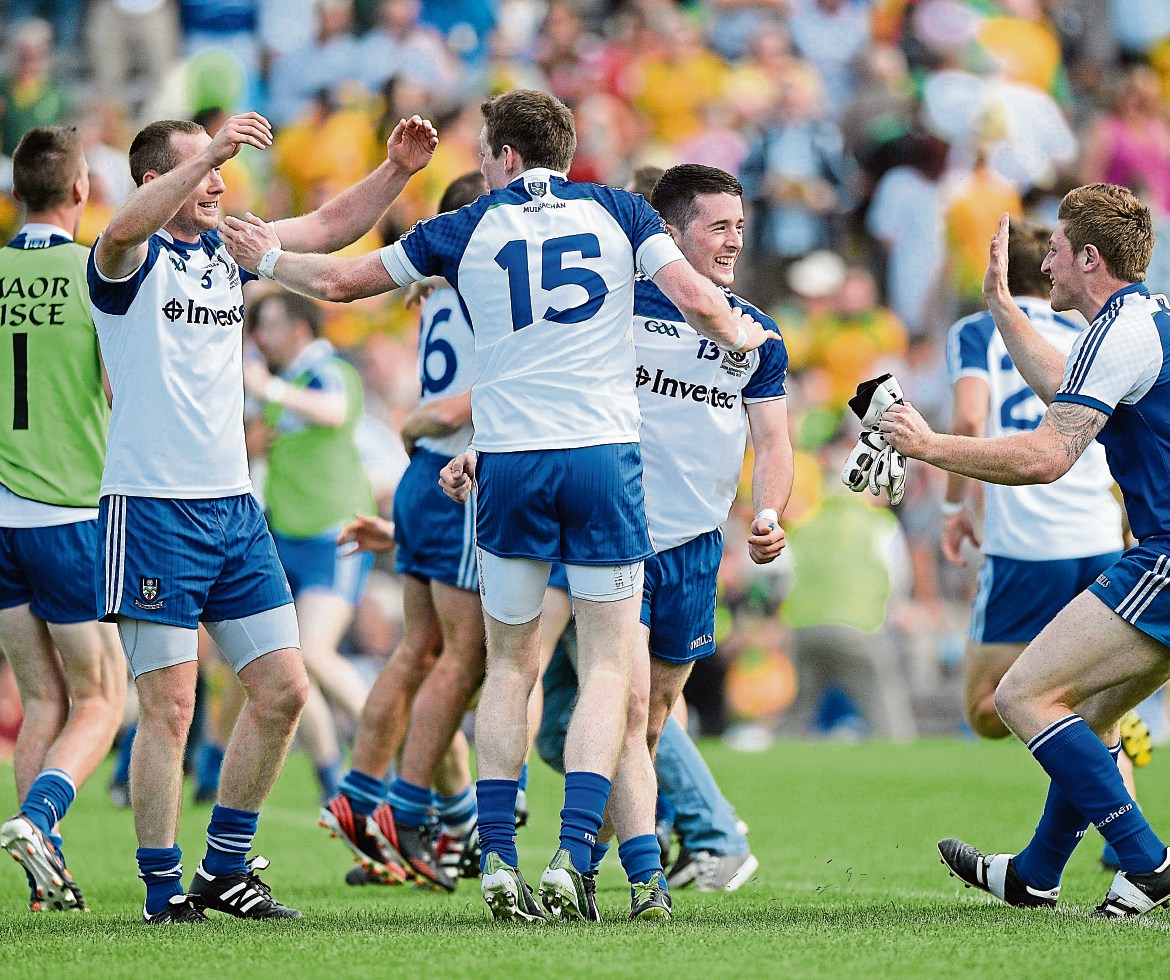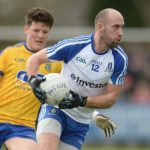Not many people say no to their first county call-up, but as Monaghan’s Christopher McGuinness explains to Shaun Casey, making good decisions have been crucial in his career
MOST teenagers would bite the hand off an inter-county manager at the chance to join up with the county senior team. That call came for Christopher McGuinness in 2010 when he was just 19 years of age.
McGuinness was a wise head on young shoulders however and felt the call came 12 months too soon. It’s not that he didn’t want to play for Monaghan and represent his county, but he wanted to wait until he was ready to do so.
Séamus McEnaney was the boss in 2010, and it was the Corduff clubman that first floated the idea of joining the county set-up. McGuinness had impressed at the u-21 trials, and his potential was clear to see.
Monaghan went on to compete in the Ulster final that season but were well off the pace when they collided with Tyrone. McGuinness wasn’t part of that journey, but it wasn’t long until he was sat in that senior dressing room.
“The first call up I got was in 2010,” McGuinness remembered. “That was my first year with the u-21 panel and Séamus McEnaney and Paul Grimley were manager and coach of that team. At the start of 2010, I was in my fresher year in DCU.
“I was asked to go to the u-21 trials, and it was actually a senior trial as well with a few of the u-21s mixed in to make up the teams and I happened to play very well. I remember after one of the games Séamus called me back and asked me onto the panel.
“I had only turned 19 the previous October and I was a wee bit conscious of where I was development wise. I had a chat with my father and the fact I was in my first year in Dublin, I wanted to have a good experience in college with the fresher team.
“DCU put a lot of work into the freshers team, and it would have been nice to win a fresher championship but that didn’t happen. I said no. I decided to wait and just maybe time it right.
“I felt that another year at club level and with the freshers would help me. I had a really good year with the u-21s with Séamus and then the natural progression just came in 2011 and Eamonn McEnaney asked me into the senior panel.
“I think Seamus respected my decision and he understood that I was in Dublin, and it was my first year in college. I’m happy with the decision I made because everything that followed after that worked out.”
He made the switch to the senior ranks in 2011 and in a few short seasons, McGuinness and his teammates achieved more than any other Monaghan side had done in the previous 25 years.
But their two Ulster Championship winning triumphs in 2013 and 2015 evoke very different memories for McGuinness. One of pure joy and elation and the other filled with frustration.
The 2013 season was a historic year for the Farney County. They toppled the provincial series for the first time since 1988 with Malachy O’Rourke calling the shots from the sideline, and McGuinness playing a key role in all of that.
The Ballybay attacker had broken through in 2011 and following two dull years to begin with, 2013 changed everything. It wasn’t straightforward either, there were bumps on the road, but standing in Clones at the final whistle made everything worthwhile.
McGuinness was involved in a Monaghan minor team that reached an Ulster final in 2008, but lost out to Tyrone, a story told too often for the men in blue and white. But that side provided the backbone of their senior success.
McGuinness was there. As was Kieran Hughes, Colin Walshe, Fintan Kelly, Dermot Malone and Kieran Duffy. All lads that went on to win two Ulster Championship medals in three seasons under O’Rourke.
“There was a crop of really good underage players coming through at that time,” recalled McGuinness. “Unfortunately, we lost that Ulster final to Tyrone and then went on and narrowly lost to Mayo in the All-Ireland quarter-final after extra-time.
“Ultimately it was those two teams in the All-Ireland final that year. Tyrone won a replay, so we weren’t that far away for such a small county at minor level.”
When he transitioned to the senior side, McGuinness was thrown right into the deep end of Division One football. Things didn’t go as planned in those first couple of seasons, and Monaghan suffered back-to-back relegations.
Not only that, but they picked up just one championship win across 2011 and 2012, against Antrim. Their seasons were brought to brutal endings by Offlay and Laois in the opening round of the Qualifiers.
“When I think back to it, I was focused on trying to get a starting jersey and the results weren’t coming. Maybe that was a sign of the couple of years of massive effort that the county had put into trying to win an Ulster title in the previous years.
“When the wins weren’t coming there seemed to be a lot of injuries and there were a few games where we were very close in 2011. We finished on the same points as Armagh (in the league), and they stayed up because they beat us earlier in the league.
“We weren’t a million miles away from staying up, but it was a relatively new panel. There was a changeover of players. Monaghan wouldn’t have been accustomed to going out that early in the backdoor.
“In 2011 and 2012 we went out in the first games, and it was difficult times because it felt like we were at a crossroads. Where do we go from here? Thankfully we got the right man in 2013 in Malachy O’Rourke.”
The first step on the road for O’Rourke was promotion from Division Three, which was achieved with the league title safely secured, giving his Monaghan men momentum heading into the championship.
McGuinness started in their wins over Antrim and neighbours Cavan, kicking 1-3 across those ties, but was met with a tough decision for the final. Instead of flashy forwards, O’Rourke wanted workhorses around the middle to beat Donegal.
Monaghan were coming up against the All-Ireland champions and weren’t given a prayer. No one outside of the Monaghan bubble gave them a shot. O’Rourke’s tactics were to mirror Jim McGuinness’ system before springing that sparkle of quality from the bench.
“I started on the bench that day,” explains McGuinness. “I was given the task of being an impact sub after starting the previous two games, so it was a shift in my role in the team.
“It was the type of team that you played wherever you were asked to play and you played whatever type of role you were asked to play. I knew that my role was to come in if the team needs me.
“You’re sitting watching the lads go three, four, five points up so early and the lads beside me on the bench were nearly like supporters with the cheering and the shouting going through the roof.
“Clones was erupting and I was trying to keep my focus and not get too excited because I knew it could change in a matter of seconds. I couldn’t let myself get too drawn in to being a spectator that day.”
Being dropped due to a tactical approach rather than form was tough to take for McGuinness. He had to put on a brave face for those few days leading up to the Ulster final, knowing he wasn’t going to be in from the start.
“It was a hammer blow as a 22-year-old. To have played in the previous two games and then be told I was being held back, the biggest thing was that I couldn’t tell anyone. I couldn’t even tell my family.
“They saw me listed in the programme to start, I was number 13 and I just had to let on I was starting but I quickly changed my mindset to what my role was because we knew with Donegal, they had a serious engine and work-rate around the middle.
“I could understand Malachy and the management team’s decision. They knew it was going to be frantic in the first half, there wasn’t going to be many scores, and towards the end of the game it would open up which would have suited me better.
“Whatever they said, we believed. Initially I was disappointed, but I quickly switched the mindset because if I wasn’t in the right mindset, it wouldn’t have been good for the team but thankfully it worked out.
“I suppose from that day onwards, I got the name of being an impact sub for Monaghan in the years to come which probably didn’t do myself any good by doing that, but that’s the role I accepted.”
McGuinness and Tommy Freeman came off the bench to kick the insurance scores as Monaghan ended a 25-year famine for an Ulster title.
“I got the call with about 25 minutes to go, and I was ready to come on.
“I scored a point and set up a couple of scores and did what I was asked to do basically, and the rest is history then when the final whistle went. One second, you’re sitting watching the game and the next you’re on the pitch surrounded by Monaghan fans.
“The most fulfilling thing at the end of that game was seeing the likes of my clubmate Paul Finlay, the likes of Owen Lennon, Dick Clerkin, Tommy Freeman, the lads that had tried so hard in the previous seven or eight years, going to Ulster finals and getting pipped by Tyrone.
“For them to win that Ulster title, it was as much satisfaction to see those lads winning it because they set the standards for Monaghan teams for so many years. The likes of me coming through the development squads, they were the lads we were watching.
“It was marvelous and to be part of it, it was only my third time of trying to win one as part of a senior team and those other lads might have been trying for ten-plus years. It’s history now and it’s great to be part of that.”
Monaghan got back to the decider in 2014, but Donegal gained their revenge. O’Rourke’s troops were slightly off the pace and a goal from McGuinness couldn’t rescue them as the Tir Chonaill side reclaimed the Anglo Celt.
That sent O’Rourke’s side through to the Qualifiers where they played a memorable encounter against Kildare in the pouring rain at Croke Park. McGuinness was the hero, bagging 1-3, as they won by two after extra-time.
“That was a crazy game and some of the best goals in ever scored in championship were probably scored that day. I remember Vinny Corey hitting the top corner and so did Emmet Bolton for Kildare.
“It was crazy and for the conditions with the torrential rain, it was a really top-quality game. The skills of the game were executed really well, and it was an absorbing game that I still remember very well.
“That was a nice win and another target that was set out by Malachy and the management team, this particular team hadn’t got a win in Croke Park so to eventually do that, it was another box ticked.
“Nearly ever objective that Malachy set out, we achieved it as a group and that kept a serious belief within the team and that kept going on into 2015 when we pushed on and got another Ulster.”
Their year was unceremoniously ended by Dublin in the All-Ireland quarter-final and the off-season proved difficult for McGuinness. Setback after setback left 2015 a year to forget, despite collecting another provincial crown.
“2015 was a funny year for me. I had a wee bit of a tidying up job to do on one of my ankles, so I spent most of January and February that year rehabbing. I remember joining back in a week before the first league game and the next day my appendix busted.
“That put me out for another six weeks and it curtailed me. I felt like I’d spent the first four months of the year going through rehab. I did manage to get back for championship and came on against Cavan in the first round and Fermanagh in the semi-final.
“I was hit with another killer blow in a club match four weeks out from the Ulster final. I got stood on and went over on my ankle and had a grade two tear and that ruled me out for the Ulster final.
“I tried everything I could to get back in time but there was too much damage done and too short a period to recover.
“These injuries usually last six to eight weeks and I was trying to fix it in four, so it was a funny old year masked with injuries.
“It was a year that I was glad to see the back off and even though I was part of the Ulster winning team in 2015, it was just one setback after the next. I was constantly rehabbing so it was a difficult year from a personal point of view.”
Through all the ups and downs at the highest level, everything always comes back to club. As a youngster, McGuinness’ first dream was the wear the maroon and white of Ballybay and get his hand on a Senior Championship medal.
He achieved that in 2012, when the Pearse’s ended a 25-year wait for the title.
“It was huge. We came back into senior in 2009 and a couple of years later, we were senior champions in Monaghan,” McGuinness reflected.
“It was such a special time for our club. To see the supporters, the joy and elation of the people that you grew up with and people that you see on the street every day, a lot of teams had gone before us and Ballybay had probably dipped.
“All of a sudden, we just had the right balance of youth and experience, and you need an element of luck too. We just happened to find a bit of form that year; we probably did have the hurt of losing two semi-finals in 2011.
“We lost to Latton by a point in the semi-finals of the league and the championship and sometimes setbacks like that drive a team on and it definitely motivated us to get back to that same position the following year.”
That was before the Scotstown stranglehold on the Mick Duffy Cup. However, Ballybay returned in 2022, having lost the deciders in 2018 and 2020, to reclaim their throne and that victory holds a special place in McGuinness’ heart.
“There was relief in 2022. We had ten years of trying and the only year since 2012 that we didn’t make a semi-final was 2015 so we’d always lost the semi-final to the eventual winner and those two finals against Scotstown as well.
“To finally get across the line in 2022 was very special. I had my son and daughter there and there’s a nice picture of me and my brother (Shane) with the two kids in our arms so that’s one that I look back on fondly.
“I have another kid there now so it would be nice before I retire to get another one and get all three of them in the picture. Never say never.”
Receive quality journalism wherever you are, on any device. Keep up to date from the comfort of your own home with a digital subscription.
Any time | Any place | Anywhere














